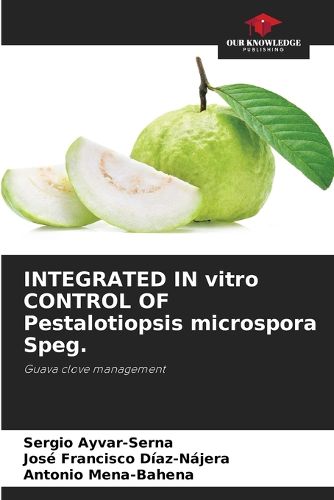Readings Newsletter
Become a Readings Member to make your shopping experience even easier.
Sign in or sign up for free!
You’re not far away from qualifying for FREE standard shipping within Australia
You’ve qualified for FREE standard shipping within Australia
The cart is loading…






This title is printed to order. This book may have been self-published. If so, we cannot guarantee the quality of the content. In the main most books will have gone through the editing process however some may not. We therefore suggest that you be aware of this before ordering this book. If in doubt check either the author or publisher’s details as we are unable to accept any returns unless they are faulty. Please contact us if you have any questions.
The present investigation was carried out with the objectives of: a) isolate and purify the fungus that causes the disease of clove in the guava crop, b) identify morphologically and molecularly the causal agent of this disease, c) evaluate the pathogenicity of the isolated fungus species, d) know the biological effectiveness in vitro of six chemical fungicides, six strains of Trichoderma spp. and six vegetal extracts against the fungus P. microspora. The Trichoderma spp. strains were found to exhibit fungistatic activity on the growth of the pathogenic fungus. The plant extracts slightly retarded fungal growth, only neem worked. The chemicals Benomil, Cercobin, Cupravit, Zineb and Captan have fungicidal action because they completely inhibited the development of the fungus. The product Manzate exerts fungistatic action. In addition, the species was identified morphologically and molecularly as P. microspora associated with guava anthracnose. The isolation of this fungus is pathogenic when inoculated on healthy guava fruits and leaves.
$9.00 standard shipping within Australia
FREE standard shipping within Australia for orders over $100.00
Express & International shipping calculated at checkout
Stock availability can be subject to change without notice. We recommend calling the shop or contacting our online team to check availability of low stock items. Please see our Shopping Online page for more details.
This title is printed to order. This book may have been self-published. If so, we cannot guarantee the quality of the content. In the main most books will have gone through the editing process however some may not. We therefore suggest that you be aware of this before ordering this book. If in doubt check either the author or publisher’s details as we are unable to accept any returns unless they are faulty. Please contact us if you have any questions.
The present investigation was carried out with the objectives of: a) isolate and purify the fungus that causes the disease of clove in the guava crop, b) identify morphologically and molecularly the causal agent of this disease, c) evaluate the pathogenicity of the isolated fungus species, d) know the biological effectiveness in vitro of six chemical fungicides, six strains of Trichoderma spp. and six vegetal extracts against the fungus P. microspora. The Trichoderma spp. strains were found to exhibit fungistatic activity on the growth of the pathogenic fungus. The plant extracts slightly retarded fungal growth, only neem worked. The chemicals Benomil, Cercobin, Cupravit, Zineb and Captan have fungicidal action because they completely inhibited the development of the fungus. The product Manzate exerts fungistatic action. In addition, the species was identified morphologically and molecularly as P. microspora associated with guava anthracnose. The isolation of this fungus is pathogenic when inoculated on healthy guava fruits and leaves.